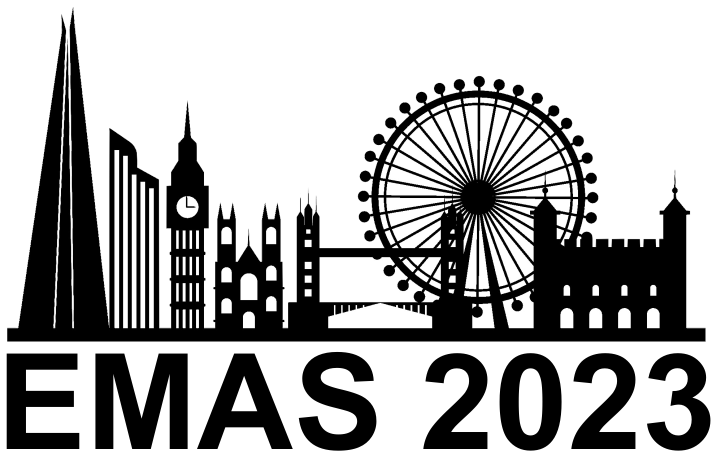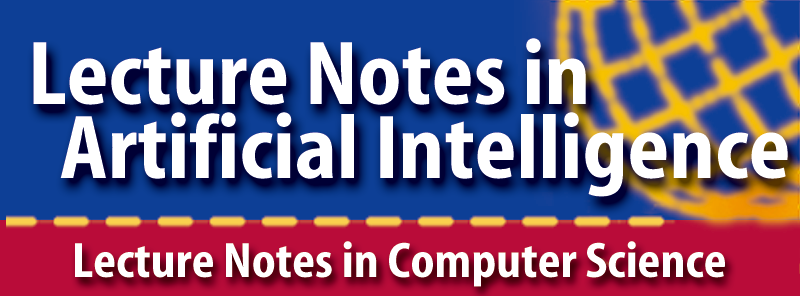
11th International Workshop on Engineering Multi-Agent Systems
In conjunction with AAMAS 2023 (29-30 May 2023, London, UK)
News: The EMAS 2023 Post-Proceedings volume is now available!
A key unifying theme underlying Artificial Intelligence and Machine Learning is the idea of intelligent software agents able to reason, act, interact, and learn. This metaphor has stimulated much research in AI and particularly in Autonomous Agents and Multi-Agent Systems, giving rise to research in agent-oriented software engineering, programming multi-agent systems, and declarative agent languages and technologies.
The Engineering Multi-Agent Systems (EMAS) workshop has been held as part of AAMAS since 2013, and was previously affiliated to AAMAS through Agent-Oriented Software Engineering (AOSE), Programming Multiagent Systems (ProMAS), and Declarative Agent Languages and Technologies (DALT) since the first AAMAS in 2002.
EMAS 2023 will provide a forum for researchers and practitioners interested in the theory and practice of engineering intelligent agents and multi-agent systems (MAS). The overall purpose of the workshop is to facilitate the cross-fertilization of ideas and experiences in the various fields to:
- enhance our knowledge of the theory and practice of engineering intelligent agents and multi-agent systems, and advance the state of the art;
- demonstrate how MAS methodologies, architectures, languages, and tools can be used in the engineering of deployed large-scale, open, and data-driven MAS;
- define new directions for engineering MAS by drawing on results and recommendations from related research areas; and
- encourage Ph.D. and Master’s students to become involved in and contribute to the area.
Despite the substantial body of knowledge and expertise developed in the design and development of MAS, the systematic development of large-scale and open MAS still poses many challenges. Even though various languages, models, techniques, and methodologies have been proposed in the literature, researchers and developers are still faced with fundamental questions attaining MAS engineering, such as:
- How to specify, design, implement, verify, test, and validate large-scale and open MAS?
- How to ensure and control the global behaviour of decentralised, large-scale, and open MAS?
- How to seamlessly integrate AI, machine learning, and data-driven techniques into the design and development of agent-based systems?
- Which (multi-)agent architectures and languages are most suitable for MAS in different domains?
- How to engineer agent and multi-agent systems that are secure and protect the privacy concerns of users?
- How to scale to the complexity of real-world application domains?
- What are the implications of MAS engineering in the context of continuous development and deployment?
- How can MAS be applied in specific application areas, such as Cyber-Physical Systems and Internet of Things / Web of Things?
- How to seamlessly integrate MAS engineering with mainstream software engineering models, languages, frameworks and tools?
- Which processes and methodologies can integrate the above and provide a disciplined approach to the engineering of MAS?

Important Dates
| Submission deadline: | |
| Author notification: | March 27, 2023 |
| Camera-ready deadline | April 27, 2023 |
| EMAS | May 29-30, 2023 |
Committees
Organising Committee
- Andrei Ciortea, University of St.Gallen, CH
- Mehdi Dastani, Utrecht University, NL
- Jieting Luo, Zhejiang University, CN
Programme Committee
- Natasha Alechina, Utrecht University
- Matteo Baldoni, Università di Torino
- Luciano Baresi, Politecnico di Milano
- Cristina Baroglio, Università di Torino
- Olivier Boissier, MINES Saint-Étienne
- Daniela Briola, University of Milano Bicocca
- Rafael C. Cardoso, University of Aberdeen
- Moharram Challenger, University of Antwerp
- Amit Chopra, Lancaster University
- Andrei Ciortea, University of St.Gallen
- Rem Collier, UCD
- Stefania Costantini, Univ. dell'Aquila
- Fabiano Dalpiaz, Utrecht University
- Mehdi Dastani, Utrecht University
- Maiquel de Brito, Federal University of Santa Catarina
- Davide Dell'Anna, Delft University of Technology
- Louise Dennis, University of Manchester
- Angelo Ferrando, University of Genova
- Lars-Ake Fredlund, Universidad Politécnica de Madrid
- Stéphane Galland, UBFC - UTBM
- Jorge Gomez-Sanz, Universidad Complutense de Madrid
- Zahia Guessoum, Université de Paris 6 and Université de Reims Champagne Ardenne
- James Harland, RMIT University
- Vincent Hilaire, UTBM/IRTES-SET
- Koen Hindriks, Vrije Universiteit Amsterdam
- Tom Holvoet, Katholieke Universiteit Leuven
- Jomi Fred Hübner, Federal University of Santa Catarina
- Joao Leite, Universidade NOVA de Lisboa
- Yves Lespérance, York University
- Jieting Luo, University of Bern
- Viviana Mascardi, University of Genova
- Simon Mayer, University of St.Gallen
- John-Jules Meyer, Utrecht University
- Roberto Micalizio, Università di Torino
- Luis Gustavo Nardin, Mines Saint-Étienne
- Enrico Pontelli, New Mexico State University
- Wishnu Prasetya, Utrecht University
- Alessandro Ricci, University of Bologna
- Luca Sabatucci, ICAR-CNR
- Valeria Seidita, Università degli Studi di Palermo
- Jaime Sichman, University of São Paulo
- Tran Cao Son, New Mexico State University
- Jørgen Villadsen, Technical University of Denmark
- Danny Weyns, Katholieke Universiteit Leuven
- Michael Winikoff, Victoria University of Wellington
- Vahid Yazdanpanah, University of Southampton
- Neil Yorke-Smith, Delft University of Technology
- Yingqian Zhang, Eindhoven University of Technology
Steering Committee
- Matteo Baldoni
- Rafael Bordini
- Mehdi Dastani
- Jürgen Dix
- Amal El Fallah Seghrouchni
- Brian Logan
- Jörg P. Müller
- Alessandro Ricci
- Danny Weyns
- Michael Winikoff
- Rym Zalila-Wenkstern